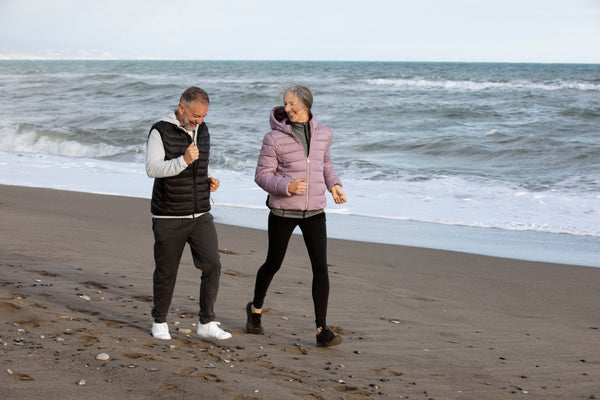For Better Health, You Only Need to Exercise This Long Each Day

A little bit of exercise can go a long way.
We are all immensely busy people. Although we all need to exercise, it can be daunting to add the 30 minutes a day that we’re always told to do. However, what if we didn’t need to do 30 minutes? What if we cram in exercise in half that time and still reap the benefits? New studies say that we can do just that.
A new study published in the online journal PLOS One conducted by researchers from Florida University as well as other universities and research facilities around the country shows that it may only actually take 7 minutes of moderate walking or other exercise every day to make a difference in our overall physical functioning and help delay the onset of major mobile disability. The study is an extension of the Lifestyle Interventions and Independence for Elders (LIFE) trial. Released in 2014, it enrolled 1,635 sedentary participants, ages 70 to 89, who all had functional limitations.
The participants were split into two groups. One received health education and performed stretching exercises. The second group took part in a structured, moderate intensity program of resistance and flexibility exercise. This was done in addition to 150 minutes of walking per week. Physical activity that raises the heartbeat is considered moderate. This can be dancing, walking, jogging, etc. Everyone in the study wore a device to measure their physical activity. They were then monitored over the course of about two years.
The Results?
The original study found the moderate physical activity group maintained their ability to walk at a rate 18% higher than older adults who did not exercise. The results also found that those who were in the moderate physical activity group saw a 28% reduction in people permanently losing the ability to walk easily. The new study focused on one question. What is the minimum amount of exercise needed before we starting seeing benefits? Researchers found the magic number in 7 minutes after analyzing the data.
What does this mean?
7 minutes of moderate exercise a day would lead to about 48 minutes a week. That’s just under an hour a week. That seems short given what we’ve always been told, right? So, how exactly does that minimal amount of time help to benefit us?
Marco Pahor, MD, director of the UF Institute on Aging, broke down why this is beneficial:
“That’s very, very little. People may say, ‘Well, doing this little can’t mean much.’ But it does. It means a great deal. That journey from nothing to a few minutes of moderate exercise daily actually bridges a chasm. There is a huge difference between doing nothing and doing just a little.”
How long is 7 minutes of exercise?
7 minutes can be the length of two songs. It could be the length of a morning shower. It could be the amount of time it takes to make coffee. The easiest thing to do in those 7 minutes would be to walk. Why? Walking is a universal exercise. It can make all the difference.
Do you have concerns that starting an exercise routine would be useless because of the daunting 30-minute a day regimen? This study may be just the thing to get us to start moving. And Pahar agrees:
“It’s never too late. Sedentary people are actually the ones who would achieve most of the benefit from those seven minutes.”
Once you get started, you won’t stop.
Once you make exercising 7 minutes a day a habit, it won’t take long to start extending your exercise time. I did something similar when I started my own walking regimen a few years ago. Start with the basic time of 7 minutes and just build on it from there as time passes.
Study co-authors include Todd M. Manini, Ph.D, an associate professor in the UF College of Medicine’s department of aging and geriatric research and a member of the UF Institute on Aging. Also participating in the study were Jacksonville Brooks Rehabilitation, Northwestern University, Pennington Biomedical Research Center, the University of Pittsburgh, Stanford University, Tufts University, Wake Forest School of Medicine and Yale University.
←Back to Main Blog





